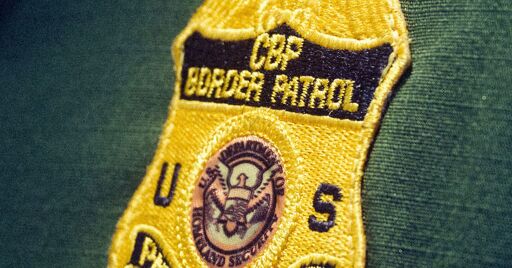- cross-posted to:
- privacy@programming.dev
- cross-posted to:
- privacy@programming.dev
Archived at https://archive.is/bnx5M
“In United States criminal law, the border search exception is a doctrine that allows searches and seizures at international borders and their functional equivalent without a warrant or probable cause.[1] Generally speaking, searches within 100 miles (160 km) of the border are more permissible without a warrant than those conducted elsewhere in the U.S. The doctrine also allows federal agents to search people at border crossings without a warrant or probable cause. The government is allowed to use scanning devices and to search personal electronics. Invasive bodily searches, however, require reasonable suspicion.”
Please stop coming here. Vacation in other countries and stay safe from our fascists.

Although this is a horrific degradation of constitutional rights, I think it does not actually extend to international airport “borders”; the phrasing on the linked page is “from any land or maritime border.”
International airports also count as the borders, as well as rivers, lochs, and waterways connecting to the ocean.
Fix the map to include those, and account for population distribution.
Can you provide a citation?
I mean, today, they don’t give a fuck where in the country you are at all, but I’ve never seen that “100 miles from an airport” substantiated.
I’ll have to look for the one I’ve quoted on reddit before, but this one covers the jist of it.
That statement is unsupported by their claimed source.
sigh debating it on Lemmy or reddit or wherever isn’t going to change their behavior. If you want to argue with them, and you’re not quite white enough to avoid getting harassed by them, here is your food for through…
The authority of U.S. Customs and Border Protection (CBP) extends beyond the physical land borders of the United States. A federal regulation establishes a “100-mile zone” where CBP agents have expanded powers to conduct certain enforcement activities. This zone also applies to international airports, which are legally considered the “functional equivalent” of a border.
The 100-Mile Zone and International Airports
It is true that the extended enforcement authority of U.S. Customs and Border Protection (CBP) includes the areas surrounding international airports. This is not a new policy but is based on a long-standing legal concept.
- Legal Foundation: The authority is primarily rooted in the Immigration and Nationality Act, Section 287 (8 U.S.C. § 1357). This statute grants federal immigration officers the power to conduct certain enforcement activities without a warrant “within a reasonable distance from any external boundary of the United States.”
- Defining “Reasonable Distance”: The specific distance is defined in the Code of Federal Regulations (8 CFR § 287.1(a)(2)). This regulation officially sets the “reasonable distance” as “within 100 air miles from any external boundary of the United States.”
- The “Functional Equivalent” Doctrine: While the law mentions “external boundary,” courts have consistently held that locations like international airports are the “functional equivalent of the border.” This judicial doctrine allows law enforcement to treat these points of entry as if they were the physical border. The U.S. Supreme Court first articulated this concept in the case of Almeida-Sanchez v. United States, 413 U.S. 266 (1973). The court reasoned that a search at a location that is the functional equivalent of a border, such as the point where a person disembarks from an international flight, is legally similar to a search at the actual border.
According to analysis by the American Civil Liberties Union (ACLU), this zone includes about two-thirds of the U.S. population.
What CBP Agents Can Do in the 100-Mile Zone
Within this zone, CBP’s authority is broader than that of other law enforcement agencies. The specific activities depend on the context, such as at a fixed checkpoint or during a roving patrol.
At Fixed Immigration Checkpoints
CBP can legally operate checkpoints within the 100-mile zone. At these locations, agents can:
- Stop Vehicles: Stop any vehicle to briefly question occupants about their citizenship and immigration status without any suspicion of wrongdoing.
- Request Documentation: Ask for documents that prove a legal right to be in the U.S.
- Conduct Visual Inspections: Visually inspect the vehicle from the outside.
- Refer to Secondary Inspection: Direct any vehicle to a secondary inspection area for further questioning, again without requiring suspicion.
Searches and Property Access
- Access to Private Land: A specific provision, 8 U.S.C. § 1357(a)(3), grants CBP agents access to private lands (but not dwellings) without a warrant within 25 miles of the border to patrol for illegal crossings.
Here is some more for you since you appear to want to argue the legal theory on this…
- Wikipedia: U.S. Border Patrol interior checkpoints
- ACLU: The Constitution in the 100-Mile Border Zone
- Congressional Research Service: The Law of Border Searches of Electronic Devices (discusses the functional equivalent doctrine)
Of course, I am not a practicing lawyer so this isn’t law advice. It’s links to articles and interpretation.
If you really want to pick a fight, go to Austin, San Antonio, anywhere north of that and south of Michigan… Find an ICE raid, and debate it with them.
I used to want to live in the US but then 2016 happened and then it happened again but worse. Much worse. I hope something better comes out of it in the end.
Also nice tidbit: international airports are considered a border too, so this shit also works within 100 miles of any airport
Backup your device and then wipe it before you cross the border. Restore from backup once you’re back home. Sure they can still request your backups from apple or google if you store them on the cloud, at least for now they need a warrant to get that info. You can load a few contacts into the wiped phone manually if you need them. Better to experience inconvenience than to give fascists ammo to throw you in prison for memes or some other bullshit.
Just get a burner. That’s what I used to do when I travelled anywhere
Anyone else anticipating a massive breach of border patrol systems by incompetent agents linking rando devices seeded with malware to their system, then passing it onto more secure networks like the clap?






